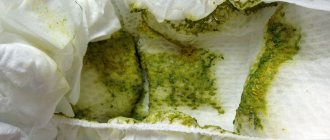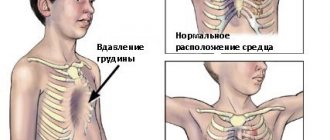Constipation in a 2-year-old child occupies a leading position among ailments encountered in pediatric practice. Functional bowel disorder manifests itself in the form of an increase in the interval between bowel movements. Constipation is also considered the appearance of painful sensations during bowel movements, even with regular bowel movements. Children react to such pathological processes with intense crying and anxiety.
Retention of stool negatively affects the functioning of the entire body as a whole. Children become lethargic, apathetic, and their appetite decreases. Retention of feces in the intestines leads to the fact that toxic substances begin to be absorbed into the blood, poisoning the body. Children suffering from chronic constipation become irritable, lethargic and fearful. Before we talk about what to do about this problem, let's find out why it occurs in the first place.
Causes
There can be many reasons for constipation in young children. Stool retention is not always a manifestation of some disease. The interval between bowel movements may be increased due to poor nutrition. Normally, a child of two years old should have stool every day with formed feces.
If the causes of stool retention are not identified and eliminated, this can lead to the development of chronic constipation, which is much more difficult to cope with. Some adults have been struggling with this problem for many years, which dates back to childhood. Experts distinguish two types of constipation – functional and organic. The reasons may differ in each case.
Organic constipation
Defecation disorders in this case are associated with intestinal abnormalities, for example, elongation of the sigmoid colon or lack of innervation of the large intestine. If problems with the intestines arose against the background of errors in nutrition and are accompanied by indigestion, then organic constipation can be ruled out. Tumors, polyps, and adhesions can cause unpleasant symptoms such as abdominal pain, bloating, and seething.
Constipation in a two-year-old child may be due to intestinal abnormalities
Functional disorder
Associated with dysfunction of the gastrointestinal tract (GIT). The following factors can cause this type of constipation in a two-year-old child:
- improper diet;
- unbalanced menu;
- insufficient consumption of natural water;
- endocrine disorders;
- anemia;
- rickets;
- hypovitaminosis;
- central nervous system (CNS) disorders;
- dysbacteriosis;
- food allergies;
- morphofunctional immaturity of the intestine;
- poisoning;
- helminthiasis;
- uncontrolled use of medications;
- conscious suppression of the reflex to defecate.
No ads 1
Functional constipation, in turn, is divided into spastic and hypotonic types. In the first case, spasm promotes compaction of stool. Hypertonicity of the intestinal muscles prevents feces from moving freely to the rectum. This condition is accompanied by colic, bloating, frequent release of gas, and a feeling of heaviness.
Important! Often the cause of functional constipation is an improper diet and an unbalanced diet.
Intestinal hypotension is accompanied by weakened peristalsis. This type of constipation, as a rule, is an intermittent disorder and is associated with the appearance of dehydration against a background of high fever, sweating, vomiting, as well as dietary errors. Most often, atony occurs in children who do not like active pastime. A sedentary lifestyle causes the muscles of the digestive tract to relax.
Constipation in a 2-year-old child may occur due to poor nutrition
Psychological problems
Despite the fact that psychological constipation is functional in nature, they are classified as a separate group due to radically different approaches to treatment. If a child is in uncomfortable conditions, he prefers to be patient and restrains the urge to defecate. This leads to the fact that feces in the intestines accumulate and become compacted. This entails pain and injury to the anus.
This usually happens during adjustment to kindergarten, as well as at a party or hospital. Bad experiences can also cause fear of defecation. If once a bowel movement is accompanied by painful sensations, the child may begin to be afraid to go to the toilet.
Poor potty training with coercion and scolding can also cause stress and discomfort. Little children should not be scolded for doing their business in their pants. You should also not force them to sit on the potty longer than they want. Patience and love are the main qualities that will help in the fight against psychological problems in a child.
[node:field_field_doprekl]
Patience is important, first of all, because neurogenic constipation, no matter how much we want, will not go away in one day. Need time. Love will help create a friendly atmosphere in the family, thanks to which the baby will get better. If you see that the child is worried and feels afraid of bowel movements, you do not need to pull him or push him.
Stay calm and positive. If you take care of proper nutrition, the stool in the intestines will be soft and after a while your child will still be forced to run to the potty. Don't forget to praise your child. You need to say out loud that such an action brought him relief.
Causes of childhood constipation
Violation of the act of defecation can occur in a child of any age. There are many reasons for this phenomenon, but they can all be conditionally divided into two large groups: functional and organic. Functional causes of constipation include: • development of food allergies • anemia • dysbiosis • excessive consumption of medications • poor nutrition, due to which the child’s body regularly receives excessive amounts of proteins and fats • changes in the usual diet • insufficient water consumption • stress • development helminthic diseases Organic constipation occurs due to: • congenital pathology of the rectum • abnormal structure of the rectum • intestinal malformations
IMPORTANT: In most cases, constipation in children occurs for physiological reasons and does not require serious medical intervention.
Symptoms
Constipation in children aged 2 years can be determined by the following signs:
- no bowel movements for more than 24 hours;
- hard and dry feces;
- a feeling of incomplete bowel movement along with too soft stool;
- excretion of a small amount of feces;
- the need to strain during bowel movements;
- stool contains both soft and hard fragments;
- pain during bowel movements;
- the appearance of blood streaks;
- flatulence, bloating, rumbling in the stomach;
- cutting pain in the umbilical region;
- inflammatory elements on the skin;
- the presence of cracks in the anus.
Frequent constipation in children 2 years old is accompanied by severe pain
My child has constant constipation, what should I do?
If a child suffers from constant constipation for a long time and all attempts by parents to normalize the process of defecation remain unsuccessful, you need to take a serious approach to the problem, namely: • visit an endocrinologist to rule out endocrine diseases that may cause constipation • undergo endoscopic examinations by a surgeon • take a general blood and urine test • do an ultrasound of the abdominal organs • undergo an ECG • with the test results obtained, consult a gastroenterologist and cardiologist, and, if necessary, take additional tests
Once the cause of persistent constipation is identified and treatment is started, the child’s condition will gradually improve.
Consequences
Constant constipation causes chronic fatigue, weakness and loss of appetite. This is due to digestive disorders, intoxication, as well as active absorption of harmful components from stagnant feces. With constipation, peristalsis slows down and feces are retained. All this causes a change in the bacterial microflora of the intestine.
Pathogenic microflora begins to actively develop and release toxic substances. The accumulation of feces causes disturbances in the trophism of the intestinal mucosa. Chronic stool retention entails dysbiosis, in which the level of beneficial microorganisms decreases, while pathogens begin to become more active. This also affects the absorption of vitamins and microelements.
All this shapes the development of vitamin deficiency and anemia. Often, against the background of dysbacteriosis, inflammatory processes begin to develop. Feces stretch the intestinal walls, causing inflammation of the mucous membrane, increased gas formation, spastic pain, and impaired local circulation.
[node:field_field_doprekl2]
Severe constipation causes cracks in the rectum, bleeding from the anus, as well as pain that can lead to the development of neurological problems. Toxic substances from the intestines begin to be absorbed into the blood. Children with chronic constipation look weak, pale, and lethargic. The child sleeps poorly, loses weight, and becomes capricious.
What should I do if my baby is constipated?
It is permissible to mechanically stimulate defecation in an infant using a special gas tube by inserting it into the child’s rectum to a depth of no more than 3.5 cm. In this case, the tube must be disinfected and its tip lubricated with Vaseline or cream.
IMPORTANT: It is not permissible to insert pieces of soap into a child’s rectum. This may cause burns to the mucous membrane.
How to help a child?
Parents need to understand for themselves that giving their child medications for constipation without the consent of a doctor is unacceptable. Even after the intestines have been cleansed, it is important to carry out comprehensive treatment aimed at restoring the microflora and normalizing the functioning of the gastrointestinal tract.
It is impossible to cure constipation without diet
An important point in the fight against childhood constipation is the organization of a daily routine. If possible, the child should be taught to eat and have bowel movements at the same time. If the body works like a clock, then you can forget about constipation. In addition, parents should teach their child to start the day with exercise and drinking cool water. Physical activity should also be done throughout the day.
This activates intestinal motility and causes the muscles to move feces towards the rectum. Children will benefit from bending over, squats, bringing their knees bent to their stomach, swinging their legs, and doing exercises for the abdominal muscles. Parents can also massage the baby's tummy, this will also help increase intestinal motility.
Enemas
First aid for acute constipation in a two-year-old child is to use a cleansing enema. To carry it out, boiled water at room temperature is used. Glycerin enhances the laxative effect of this procedure, so you can add a teaspoon of emollient to a glass of water. At the same time, during the enema you should not forget about safety measures.
The pear must be disinfected before use. Its tip is lubricated with Vaseline or baby cream. You should not use warm water, as it will simply be absorbed into the intestines along with toxins from stagnant feces. Do not use too much water. This can injure and stretch the intestines, causing sharp spasms and pain.
An oil enema is used to lubricate hard stool and facilitate its passage through the intestines. For 500 ml of water you need to add 50 ml of olive or sunflower oil. Vaseline enema is done with heated oil. This procedure helps to quickly empty the intestines of stagnant feces.
Enemas have a number of limitations due to their use:
- sharp pain against the background of an “acute abdomen”;
- abdominal wall muscle tension;
- discharge of blood from the anus during bowel movements;
- smearing in the absence of bowel movements.
In some cases, a laxative will be needed. Glycerin suppositories are highly effective and safe. They are even used to treat newborns. All of the above measures will be enough to provide a laxative effect, but these are only emergency measures, and this is where treatment is just beginning. You should definitely contact a specialist and undergo a comprehensive examination to find out the root cause of this problem.
The fight against stool retention is a purely individual issue. The choice of treatment is influenced by a large number of factors, among which are the presence of concomitant pathologies, the psychological state of the baby, and the causes of the disease. Parents should understand that the treatment process may take a long time. In some cases, restoration of the intestines and elimination of psychological problems takes more than one year.
An enema will help cleanse your baby's intestines
Medicines
A laxative medicine will help you quickly cope with constipation, but it is important to understand that such drugs have a number of side effects and can be addictive. Lactulose-based laxatives are allowed for children two years of age. A well-known remedy is Duphalac. This medicine is available in syrup form.
Lactulose, which is included in the composition, inhibits the absorption of liquid, due to which the intestinal contents soften and peristalsis is activated. Duphalac is not only a laxative, but also a prebiotic. It promotes the colonization of the intestines with beneficial bacteria. Thanks to these properties, digestion processes and nutrient absorption are improved, and the number of opportunistic microorganisms is reduced.
During the treatment period, the child should drink enough liquid.
Contraindications to the use of the drug are:
- individual intolerance to components;
- intestinal obstruction;
- suspicion of acute appendicitis;
- intestinal bleeding.
Duphalac does not have a rapid effect. It works gently, without irritating the intestines or inhibiting muscle tone. The result can be seen three days after the start of treatment. Lactulose-based products are approved for long-term use, which cannot be said about most other laxatives.
What to feed a child with constipation?
Such medications do not reduce the sensitivity of intestinal receptors and are not addictive. However, it is unacceptable to use Duphalac uncontrolled and without a doctor’s prescription.
This is due to the fact that in some cases, constipation can only be a symptom of some serious illness. Sometimes Duphalac can cause unpleasant side effects such as flatulence, discomfort and abdominal pain.
In some cases, doctors even prescribe medications to help relieve gas. The development of increased gas formation is explained by the breakdown of glucose and its interaction with intestinal contents, which results in the formation of carbon dioxide. Long-term use of Duphalac often requires an increase in dosage.
Duphalac will help relieve constipation in a two-year-old child
Treatment of constipation in children 2 years old
Treatment is not limited to just one treatment method; an integrated approach is used. For functional constipation, diet therapy, active games, massage, formation of a bowel movement regime, and psychological work with the child are used. If non-drug treatment does not help, the child can be treated with home remedies and laxatives (strictly under the supervision of a doctor).
Recommendations for home treatment
In about half of the cases, intestinal function can be normalized without the use of medications; for this you need to adjust the baby’s lifestyle. What you can do at home:
- Give your child more to drink. Lack of fluid often leads to difficulty defecating. How much water to give per day depends on your weight - 50 ml of water per 1 kg of weight.
- Form a bowel movement routine for your baby. Organize a comfortable and convenient toilet, do not allow negative emotions during the act of defecation. Teach your baby to have bowel movements at the same time.
- Avoid the morning rush; the child should have breakfast slowly.
- Atonic constipation is common in children, so they need to maintain an active lifestyle. Spend more time outside, play active games, limit your time watching TV.
- Reflex stimulation will help get rid of symptoms - before eating, do a light abdominal massage in a clockwise direction for 5 minutes.
Diet
To normalize intestinal function, you need to eat right. For a child aged 2 years, it is recommended to eat split meals 6 times a day - 3 main meals and 2 snacks.
What foods have a positive effect on intestinal health:
- Containing fiber: fresh vegetables and fruits, berries, herbs, bran, rye bread.
- Fermented milk products that improve intestinal motility and prevent dysbiosis: kefir, yogurt, yogurt without additives.
- Sources of potassium: prunes, figs, raisins, dried apricots.
- Oatmeal and buckwheat porridge.
It is necessary to limit the consumption of foods that inhibit bowel emptying - strong broths, semolina porridge, jelly, puree soups. Chocolate, baked goods, and smoked foods should be completely excluded from the diet.
To treat constipation in children, it is important to adjust nutrition and ensure a favorable psychological climate.
Laxatives
If non-drug treatment is ineffective, medications that have a laxative effect can be used.
They should be used carefully, as side effects may develop - addiction, dehydration, allergic reactions. Before using laxatives, you should definitely consult your pediatrician and carefully follow the instructions.
What laxatives can be used in children aged 2 years:
- Oils that have a softening effect are castor, vaseline, sea buckthorn. They can be given orally or administered rectally as suppositories.
- Herbal laxatives. These are mild laxatives that contain senna leaves or rhubarb root - Senade, Senadexin.
- Prebiotics with a mild laxative effect (based on Lactulose).
Folk remedies
Often, folk recipes based on medicinal herbs or food are used to treat constipation.
| Name | Recipe | How to use |
| Prune decoction | Rinse 50 grams of prunes under water, pour a glass of boiling water and cook for 15 minutes. Strain and let cool. | 50 ml 3 times a day 30 minutes after meals. |
| Rhubarb root infusion | 1 tbsp. l. pour 1 cup of boiling water over rhubarb root and leave for 12 hours. | 1 tbsp. l. before bedtime. |
| Flax seed infusion | 2 tbsp. l. Pour boiling water over flax seeds and let steep for 8 hours. | 1 tbsp. l. 3 times a day before meals. |
Folk remedies
Proven traditional medicine recipes will help you cope with constipation and restore normal bowel function:
- Wheat bran and seaweed are natural laxatives. They can be added to food or consumed separately with water. In the intestines they swell, increasing the volume of feces, diluting, and also accelerating the evacuation process;
- infusions of senna leaves. For a glass of water you need to take a tablespoon of raw material. The product should be brewed in the evening and filtered in the morning. The child should be given a tablespoon of infusion three times a day;
- rosehip juice and leaves. Populists advise grinding rosehip leaves with sugar, and pouring spring water into the squeezed juice;
- tea made from dried apples and cherries;
- cabbage brine has a pronounced laxative effect;
- Give your child oatmeal jelly or plum broth several times a day.
My child is constipated from formula, what should I do?
If a bottle-fed baby often experiences constipation and returning to breastfeeding is impossible, urgent measures must be taken.
Firstly, in such cases, consultation with a pediatrician is necessary. The doctor may ask you to take a test for dysbiosis and, based on its results, prescribe treatment or prescribe a laxative.
Secondly, one of the feedings with a regular formula should be replaced with feeding with a fermented milk formula. Due to the different chemical composition and content of lactic acid bacteria, these mixtures are quickly digested, pass into the intestines, and then leave it painlessly.
IMPORTANT: Fermented milk mixtures and fermented milk products are not the same thing. Under no circumstances should you replace the fermented milk mixture with kefir, fermented baked milk or sour cream.
Thirdly, if complementary foods have already been introduced, then it is worth focusing on plum, apple and carrot purees. You also need to offer your child water, compote, or prune decoction as often as possible.
Does dill water help with constipation?
Dill water can relieve spasms in the intestines and help the baby get rid of constipation on his own. The drug is made from fennel or dill, purified water and essential oils. To treat and prevent constipation, infants are given 1 tablespoon of dill water 4 to 6 times a day. The product is sold in pharmacies and has no side effects even in newborns.
You can prepare dill water yourself. For this, 0.5 tsp. dried dill seeds need to be poured with 100 g of boiling water and left for at least half an hour. Before use, be sure to strain the product through a fine sieve. The baby is given 1 tsp. of this water before each feeding.
IMPORTANT: You cannot store homemade dill water for more than one day.
Physical exercises for children with constipation
Special physical exercises are necessary for children suffering from constipation. For newborn babies, these exercises consist of bending and straightening the arms and legs, and lightly massaging the tummy.
For older children, active sports, gymnastics, outdoor games, and swimming are recommended. Every day you should perform exercises for blowing out and retracting the abdomen, turning the torso.
Diet for a child with constipation: menu
Parents can relieve their child of constipation by organizing a balanced diet. It is the correct healthy diet of the child that is the basis of treatment.
The daily diet of a child suffering from constipation should consist of at least 50% vegetables and fruits. They can be offered both fresh and processed.
IMPORTANT: If fruits and vegetables are used in salads and purees, then you cannot season the dishes with sour cream or mayonnaise, since these fatty foods greatly inhibit intestinal function.
Due to their high fiber and pectin content, the following vegetables and fruits best stimulate the rectum: beets, carrots, cabbage, zucchini, squash, plums, melons, watermelons.
IMPORTANT: For constipation, tomatoes and cucumbers are of little use; eating legumes is unacceptable.
First courses are a must in a sick child's diet. They should be cooked in low-fat meat and vegetable broths with the addition of gray cereals. Serve with black or bran bread made yesterday.
The child needs to consume fermented milk products twice a day. These can be low-fat yoghurts, kefir, fermented baked milk, yogurt. It is recommended to drink them in the morning on an empty stomach and immediately before bed. Be sure to eat bran in any form.
IMPORTANT: For constipation, the following are strictly prohibited: fresh baked goods, whole milk, cakes, carbonated drinks, canned food, rice, jelly, jelly, semolina porridge, scrambled eggs, cocoa, sweet, fried and smoked foods.
Potassium-containing dried fruits, dried apricots, prunes and figs help normalize the functioning of the intestinal muscles. You can offer them to your child in compotes or in their natural form.
Laxative for newborns and infants
Not every baby laxative can be used to relieve constipation in a newborn baby. If there is an urgent need to resort to the treatment of constipation in a baby, you can use one of the following options: • tea with fennel and chamomile, dill water • Plantex • Duphalac • Microlax • Prelax, Normolakt
IMPORTANT: If a newborn has frequent constipation, parents should contact a pediatrician to identify and properly eliminate the causes of the disease.









